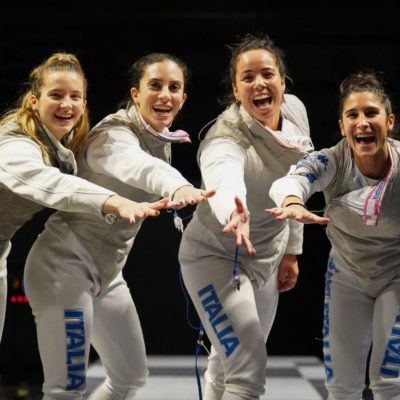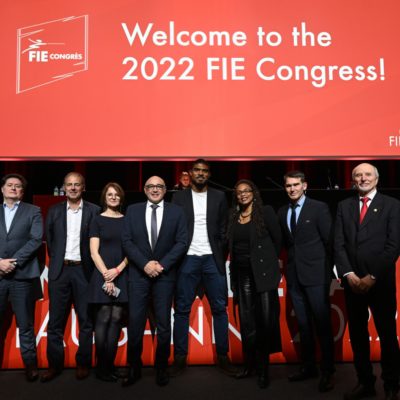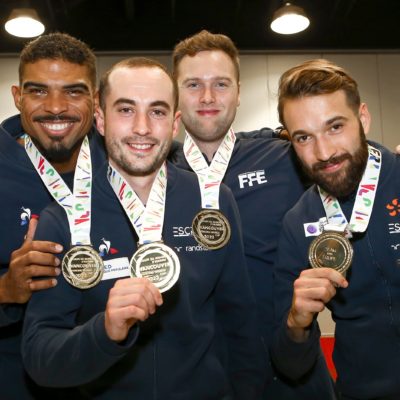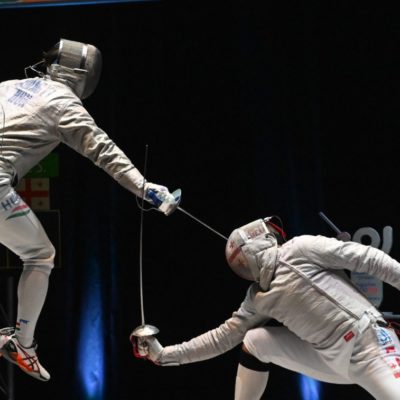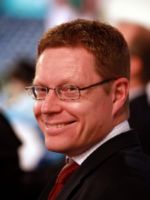 Serge Timacheff interviewed the president of the FIE Directois Technique , Per Palmström while at the FIE World Championships in Beijing, China. The World Championships for Men’s Team Foil and Women’s Team Epee also served as a test event for the upcoming Beijing Olympic Games.
Serge Timacheff interviewed the president of the FIE Directois Technique , Per Palmström while at the FIE World Championships in Beijing, China. The World Championships for Men’s Team Foil and Women’s Team Epee also served as a test event for the upcoming Beijing Olympic Games.
{audio}http://media.fencing.net.s3.amazonaws.com/podcast/Per_Palmstrom_Interview_080430.mp3{/audio}
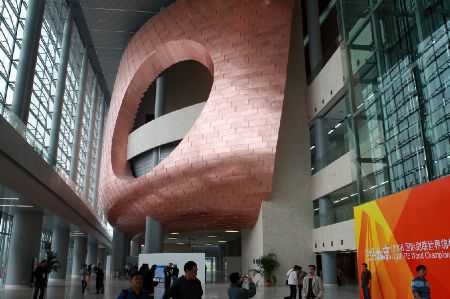
Photo: Entrance to the Beijing Olympic Fencing Hall. Courtesy Serge Timacheff, FencingPhotos.com
Transcript:
Serge Timacheff: I’m in Beijing China at the FIE World Championship for 2008 as well as the Olympic Fencing test event with Per Palmstöm. He’s the president of the FIE directois technique, which is also the technical director. And Per, first tell us what the FIE directois technique is for people who aren’t familiar with the structure of the FIE and how it operates.
Per Palmström: Okay. Well we’re appointed by the FIE. And really from a formal point of view I would say that our responsibility is to make sure that the competition is run according to the FIE’s rule for how an Olympic games are supposed to be run. And what does that mean then? Well, I would say it’s making sure that we are applying the right rules regarding the ranking. The right fencers are meeting the right fencers.
I mean, the bouts are correctly made and that the timing is respected in everything. We are not the referees because the referees are taking care of the actual bouts and matches. You know, when they start and when it’s over; but up until then and afterwards, also taking care of the result, verifying it, put it into the competition and making it smoothly and the running of the competition smoothly.
Serge: In the last interview that we did, I interviewed Ion Pop. Now he’s the technical director for the FIE. How do those roles differ? How does it differ from what he does and what you do?
Per Palmström: Okay. Eon Pop is employed by the FIE. I’m not. And we’re a group of people in the Director Technique or the DTS, we normally say. We’re just appointed for a specific competition. We have the right for this competition, for instance, to give warnings and black cards to people who doesn’t behave on the competition venue and so on. So Pop hasn’t.
He is more like in charge of everything up until the competition starts. Helping the local organizer, making sure that the installations are correct and things like that. And Pop is also engaged, of course, in the development of fencing in the world with the different fencing centers and so on. So it’s completely different roles, even though I realize that the wording and the names are a bit similar.
Serge: So as I said in the beginning of the interview, we’re in Beijing for a two part event here. We have a world championship, which are the two events that have been fence that will not be at the Olympic Games, in this case women’s team epe and men’s team foil. And we’ve completed those events. And today we’re having what we’re calling the Olympic test event, which is, I understand, not an event where there are points or qualifications going on but it’s an opportunity – in this case it’s men’s individual foil – we have an opportunity to test all the different various factors that will go into this Olympic venue when the actual fencing begins. Do I have that right?
Per Palmström: That’s correct. I mean, sometimes during the competition on Friday and Saturday, which actually was the world championship; we tended to, I shouldn’t say, forget it but to us it was all like a big test because we are on the right venue with the right equipment and all that. But those were really world championships. And this is, today is really the test event. But it has, of course, been very good tests, all three events that we have had here this weekend.
Serge: So since we’re nearly complete with three days of good strong fencing here at this Olympic venue; how does it look? And how does it seem?
Per Palmström: I must say, I’m impressed. It looks very good and I’m optimistic that we will have a good Olympic games here. I think the Chinese has impressed me. I have especially worked close to two people, the competition manager, which is the man who’s in charge of the competition from the Chinese point of view, the Beijing Olympic organizing committee point of view. And also a very competent lady who is in charge of the actual venue where we are fencing. And both of them come across as very professional, very knowledgeable. And I have really enjoyed working with them.
Serge: So give us a little bit more detail about what kinds of things you’re looking for, what you’re sort of “testing,” what problems you might be perceiving or what things you might be changing?
Per Palmström: People who are arranging competitions around the world for young kids and so on, they might have large competitions. Like in Sweden sometimes we have like 250, 300 kids at the same weekend. I would say from my point of view, you could say actually they are more difficult that this competition. But that’s not really true. Because this is also, of course a difficult competition but it’s completely other things that are difficult.
I mean, taking the team events for instance is just eight teams. And anyone who has organized a fencing competition will say well, that’s easy. You just put them in a tableau and you have the quarter finals, the two semi-finals and the final. And perhaps also a fight for the third place and that’s it. But with the Olympics there’s so much else that has to be correct. For instance, we have the spectators. We have to make sure that we really give a good impression to everyone who comes to the fencing venue. Not only because we like to do that for the audience, it’s also some very important people for fencing that come, _____ people and otherwise. And for – sorry.
Serge: Sure. In Athens, I mean, we saw Jacques Rose come to the Olympics. We saw Prince Albert. We saw the president of Italy. There were a lot of dignitaries and people that come and observe. And you want to treat them in the correct manner, I suppose.
Per Palmström: I mean, it’s like the window of fencing every fourth year when people really pay attention to what we’re doing. And we have to show a professional face like we are developing and really giving a good impression of what we do. And also, I suppose, the bottom line is we have to make sure that we stay on the Olympic program. And in order to be able to do that we have to deliver a very good product to them.
Serge: I must say, this fencing building here – we’re about two buildings away from the famous water cube. And we’re in sight, out of the windows of the famous bird’s nest here. So we’re right in the main area of the Olympic property. And the building is absolutely immense here. I mean, I’ve never seen a fencing hall or building quite this large. And it just seems endless. Does the sheer size present any sort of specific issues?
Per Palmström: Well in the beginning it did. I suppose we were waiting for people and they got lost somewhere among all the corridors and-
[End of Audio]


